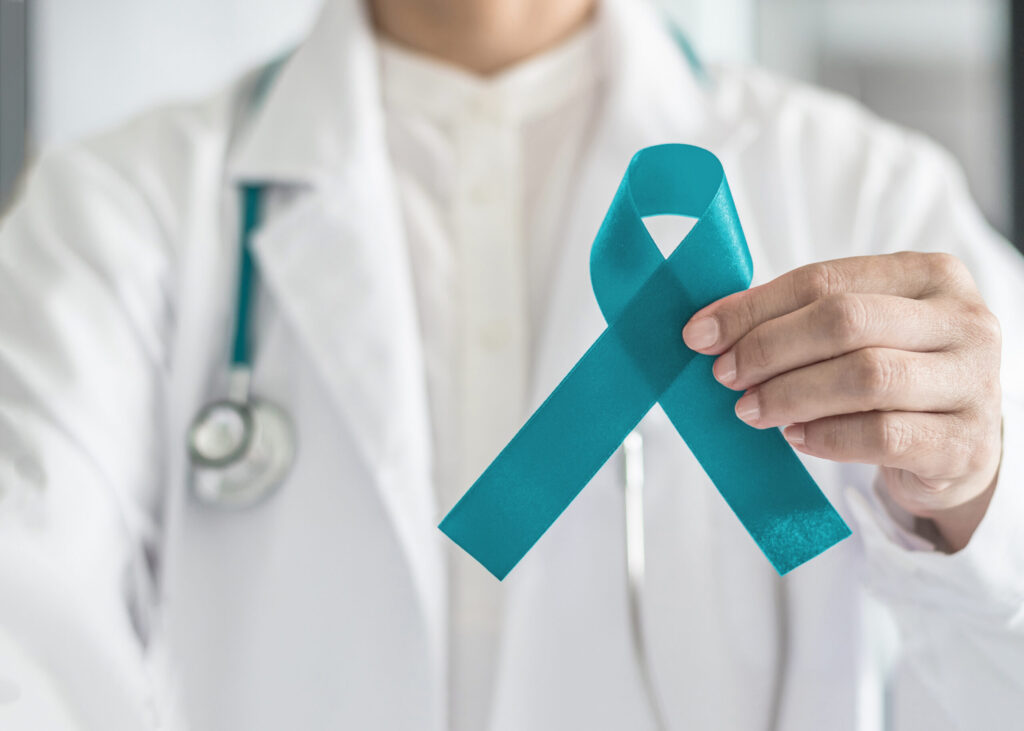- When stressed out, your body releases certain hormones that cause your immune system to weaken, making you more susceptible to getting sick and developing UTIs.
- Your sexual activity, diet, hygiene, and other factors can also contribute to getting UTIs, so maintaining a healthy diet, hydrating constantly, and practicing safe sex are important preventative measures.
- If not treated properly and promptly, a UTI can become a more severe bladder infection and have lasting adverse effects on how your body and urinary tract function.
- Prevention is always better than treatment, but you have a plethora of options to choose from in both categories. If you’re worried about your urinary tract health, seek help from a medical professional.
Polycystic ovarian syndrome, commonly known as PCOS, is a condition that affects up to 10% of women of reproductive age worldwide. PCOS can be recognized by a combination of symptoms that can include irregular menstrual periods, weight gain, acne, excessive hair growth, and difficulty getting pregnant. PCOS can have a significant impact on women’s health, both physically and emotionally.
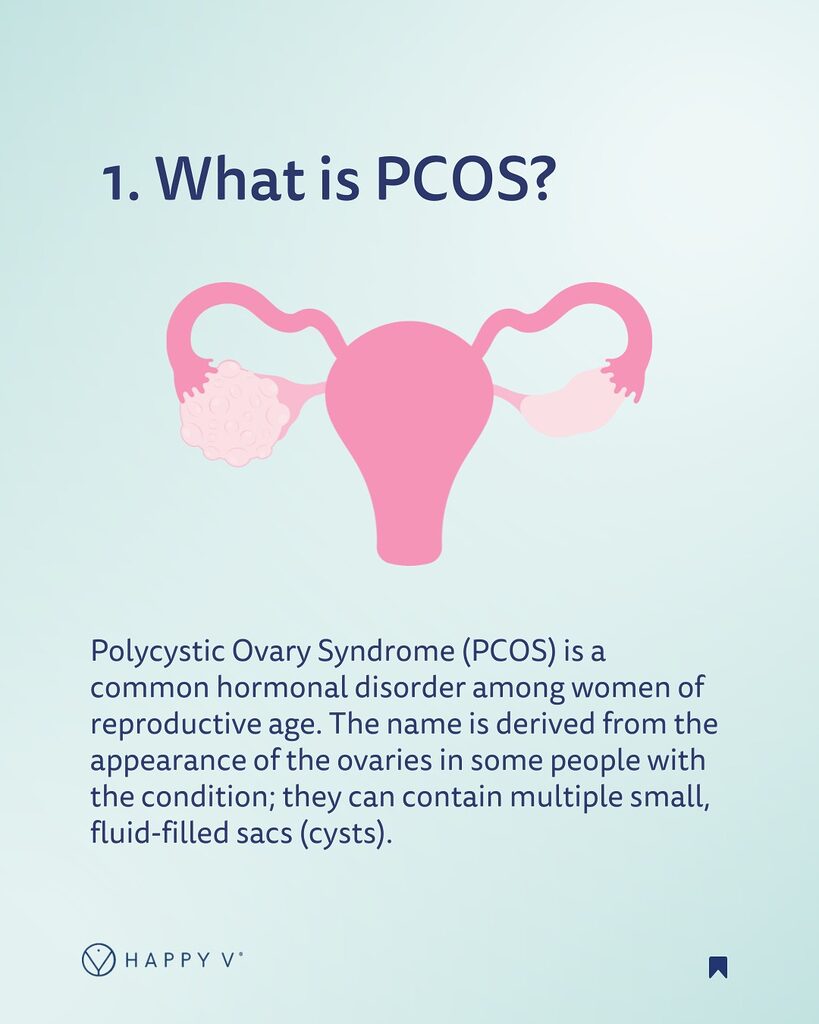
Despite its prevalence, the exact causes of PCOS are not fully understood. Research suggests that PCOS may be linked to insulin resistance, genetics, and lifestyle factors such as diet and exercise.
PCOS can be a challenging condition to diagnose and manage. Still, with early intervention and appropriate treatment, many people can effectively manage their symptoms and improve their overall health and well-being.
This post will explore the various treatments available for PCOS, including lifestyle changes, medication, and other common interventions to help those with PCOS lead happy, healthy lives.
Causes and Risk Factors
Polycystic ovary syndrome is a complex condition; its exact causes are still debatable. Research suggests genetic, hormonal, and lifestyle factors influence the risks of having PCOS. Studies have shown that specific genes may be associated with PCOS and that hormone level imbalances, exceptionally high levels of androgens, or other male hormones may also play a role.
Lifestyle choices such as a poor diet and a sedentary lifestyle may contribute to the development of insulin resistance, which is also associated with PCOS.
While the exact causes of PCOS remain unclear, understanding the potential risk factors can help individuals take proactive steps to manage their health.
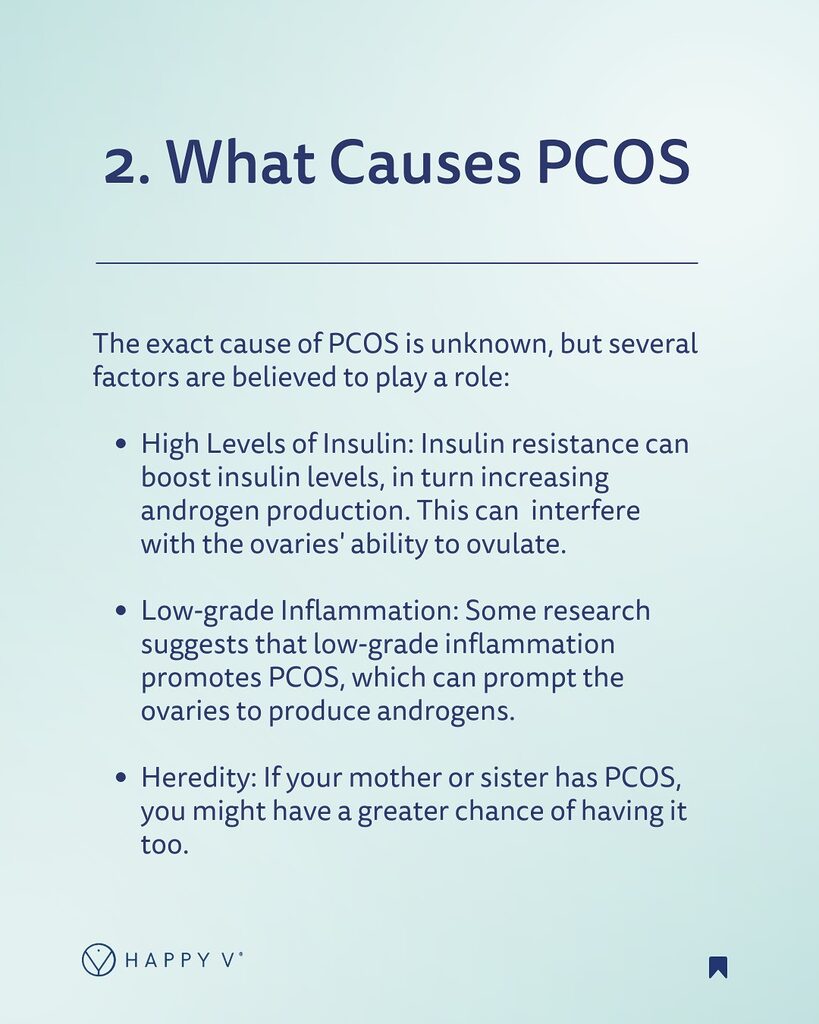
Hormonal Imbalances
In the case of PCOS, hormonal imbalances are a key factor. Women with PCOS have excess androgens (male hormones), such as testosterone, in their bodies, which can lead to symptoms such as acne, excessive hair growth, and irregular periods. Studies have reported that women with PCOS have up to two to three times higher testosterone levels than women without.
Additionally, women with PCOS have higher levels of luteinizing hormone (LH) compared to women without PCOS, with one study finding that women with PCOS had an LH level that was two to three times higher than women without the condition.
These hormonal imbalances may contribute to developing cysts (fluid-filled sacs) on the ovaries, characteristic of PCOS.
Insulin Resistance
Up to 70% of women with PCOS have insulin resistance, which occurs when the body becomes less responsive to insulin, a hormone that helps regulate blood sugar levels. This can lead to high levels of insulin in the blood, which can stimulate the production of androgens by the ovaries.
Insulin resistance can also increase the risk of type 2 diabetes and other metabolic disorders in women with PCOS.
Genetics
Studies have shown that PCOS tends to run in families, indicating a potential genetic component. Women with a mother or sister with PCOS are more likely to develop the condition. The prevalence of PCOS is estimated to be 20–40% in sisters of affected women and 30% in daughters of affected women, compared to a 6.6% prevalence in the general population.
While the exact genes involved in PCOS are still undetermined, research suggests that multiple genes may be involved in the development of the disorder.
Inflammation
Inflammation is also a possible factor in developing PCOS. Studies have found that women with the disorder have elevated levels of inflammatory markers such as C-reactive protein (CRP) and interleukin-6 (IL-6) compared to those without PCOS. One study found that women with PCOS had significantly higher markers.
Interestingly, another study showed that a low-calorie diet significantly decreased CRP levels in women with PCOS. While more research is needed to understand the relationship between inflammation and PCOS fully, these findings suggest that inflammation may play a role in the disorder.
Environmental Factors
Besides genetic and hormonal factors, environmental factors may also contribute to developing PCOS. Exposure to certain environmental toxins, such as endocrine-disrupting chemicals (EDCs), has been linked to an increased risk of PCOS. EDCs, such as BPA and phthalates, can interfere with the normal function of hormones in the body, including follicle-stimulating hormone (FSH) and luteinizing hormone (LH), which are involved in the menstrual cycle and ovulation.
Other environmental factors associated with PCOS include sleep apnea and exposure to air pollution during pregnancy. Sleep apnea, a condition in which breathing stops and starts during sleep, is more common in women with PCOS than those without. Additionally, exposure to air pollution during pregnancy has been linked to a higher risk of PCOS in offspring, according to another study. However, further research is needed to fully understand the impact of environmental factors on the development of PCOS.
Symptoms and Diagnosis
Diagnosing PCOS can be challenging, as no single test can definitively diagnose the disorder. Instead, diagnosis typically involves a combination of medical history, physical exam, and laboratory tests. Medical history and physical exams can provide essential clues to the presence of PCOS, while laboratory tests can help confirm the diagnosis.
Some of the diagnostic criteria for PCOS include:
- The presence of irregular periods or no periods
- The presence of androgen excess symptoms, such as excess body hair in the armpits and face or acne
- Presence of polycystic ovaries on ultrasound
- Elevated levels of androgens, such as testosterone, in the blood
It’s important to note that not all individuals with PCOS will experience all of these symptoms, and the severity of symptoms can vary widely from person to person. It’s important to consult with a healthcare provider if you suspect you may have PCOS.
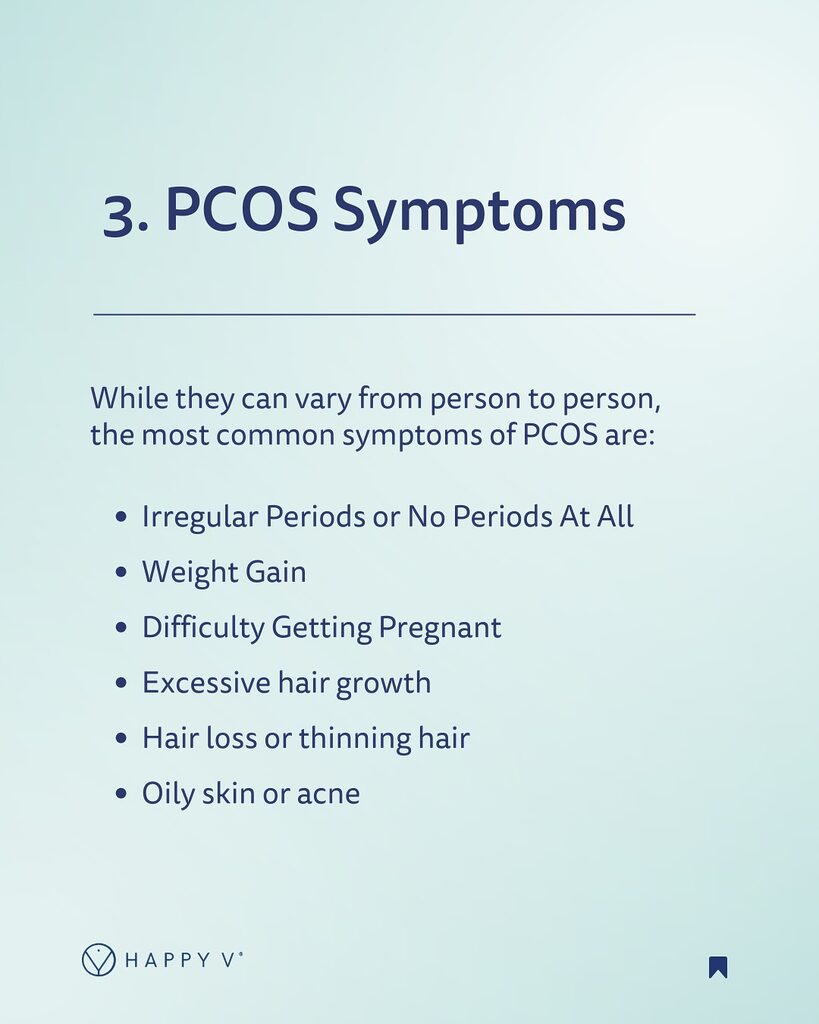
Irregular Periods
One of the most common symptoms of PCOS is irregular periods. Those with PCOS may experience menstrual cycles that are longer or shorter than average, or that occur irregularly. This is due to hormonal imbalances, specifically estrogen and progesterone, that can prevent the ovaries from producing and releasing eggs regularly.
Up to 80% of women with PCOS experience irregular periods. It’s important to note that other factors, such as stress, weight changes, or certain medications, such as oral contraceptives, can also cause irregular periods. Therefore, if you are experiencing irregular periods, you must talk to your healthcare provider to determine the underlying cause and appropriate treatment to return to a healthier menstrual cycle.
Excessive Hair Growth
Another symptom of PCOS is excessive hair growth, also known as hirsutism. This can manifest as unwanted hair growth on the face, chest, or abdomen and can be a source of distress for many individuals. Hirsutism occurs because of an excess of male hormones called androgens, which can be produced in greater amounts in those with PCOS.
Data shows that up to 70% of women with PCOS experience hirsutism. This symptom can be challenging to manage, as traditional hair removal methods like shaving or waxing may not be effective in the long term. Anyone with PCOS experiencing hirsutism should speak with their healthcare provider to explore treatment options and develop a plan that works for them.
Acne
In addition to irregular periods and excessive hair growth, PCOS can cause acne. High levels of androgens, which are male hormones that women also produce, can lead to acne or oily skin development. Androgens stimulate the sebaceous glands in the skin, causing them to produce more oil. This excess oil can then clog pores and lead to acne.
It’s important to note that not all individuals with PCOS will experience acne, and some may only have mild symptoms while others might have it more severe. Treatment for acne associated with PCOS may involve topical and oral medications and lifestyle changes such as a healthy diet and exercise. If you have concerns about acne or any other symptoms of PCOS, as always, it’s best to talk to your healthcare provider.
Weight Gain
Women with PCOS may struggle with weight gain, obesity, or other conditions related to metabolic syndrome because high insulin and blood glucose levels can increase hunger and fat storage. Additionally, those with the condition have slower metabolisms, making it harder to burn calories.
Data shows that up to 80% of women with PCOS are overweight or obese, making weight management an essential aspect of treatment. Losing even a small amount of weight can help improve symptoms such as irregular periods and fertility issues. A healthcare provider can work with individuals with PCOS to develop a personalized weight management plan that includes a healthy diet, regular exercise, and possibly medication to help manage insulin levels.
Hair Loss
While excessive hair growth is a common symptom of PCOS, some individuals may also experience hair loss or thinning. Androgenic alopecia, also known as female pattern hair loss, occurs when androgens, which are male hormones, cause hair follicles to shrink, leading to hair loss or thinning.
According to data, up to 40% of individuals with PCOS may experience hair loss or thinning. However, other factors, such as genetics, age, and other medical conditions, can also contribute to hair loss or thinning.
This can be a distressing symptom for those who experience it, but treatments are available to help manage androgenic alopecia in PCOS. It’s important to seek help from a professional to determine the exact cause and appropriate treatment plan.
Difficulty Getting Pregnant
PCOS can cause difficulty getting pregnant due to irregular ovulation, making it harder to predict when ovulation will occur and, therefore, harder to conceive. This can also result in irregular menstrual cycles or periods. In some cases, medications like clomiphene can help regulate ovulation and improve the chances of conceiving.
It’s important for individuals with PCOS trying to conceive to work closely with their healthcare provider, as there may be an increased risk of complications during pregnancy.
Additionally, individuals with PCOS may have other underlying health conditions, such as endometrial cancer or hyperplasia, that can further complicate pregnancy. Regular monitoring and treatment of these conditions by a specialist in endocrinology or gynecology may be necessary.
Those with the condition should also speak to a professional about their medical history, including any symptoms like irregular periods, excess hair growth, hair loss, pelvic pain, or other concerns. Blood tests and physical exams, including pelvic exams, may be used to diagnose PCOS. Early diagnosis and treatment can help manage symptoms and improve overall health.
Health Risks and Complications
PCOS is a complex condition that affects many individuals with female reproductive organs. While its symptoms can vary widely, from weight gain to hair loss, PCOS can also increase the risk of several health complications and long-term health problems if left untreated.
It’s important to understand the risks associated with PCOS and take steps to manage them, including regular checkups with healthcare providers and making lifestyle changes to improve overall health and wellness. The following sections will explore some of the most common health risks and complications of PCOS.
Infertility
PCOS is a common cause of infertility, as it can interfere with regular ovulation, making it more difficult to conceive. A study published in the journal Human Reproduction found that women with PCOS have a 2.3 times higher risk of infertility than women without PCOS. The study looked at 520 women with PCOS and 302 women without PCOS, and among women with PCOS, 39% experienced infertility compared to 16% of women without PCOS.
Infertility can be a distressing and frustrating aspect of PCOS, and it’s important to seek help from a healthcare provider if you’re struggling to conceive. Several treatment options, such as ovulation-inducing medications like clomiphene or injectable gonadotropins, can increase ovulation and conception chances. In some cases, in vitro fertilization (IVF) may be recommended. However, it’s essential to remember that not all people with PCOS struggle with fertility, and it’s possible to conceive naturally with the proper treatment and support.
Gestational Diabetes
PCOS can have an impact on health during pregnancy as well. Those with PCOS who become pregnant are at a higher risk of developing gestational diabetes, a type of diabetes that occurs during pregnancy. Gestational diabetes can cause many complications for both mother and baby, including an increased risk of high blood pressure, premature birth, and cesarean delivery. It’s important for women with PCOS who are pregnant or planning to become pregnant to be aware of their increased risk and to work with their healthcare provider to manage it.
According to a study published in the Journal of Clinical Endocrinology and Metabolism, women with PCOS have a 2.6 times higher risk of gestational diabetes than women without PCOS. The study included 173 women with PCOS and 173 women without PCOS and found that 17.9% of women with PCOS developed gestational diabetes compared to 6.9% of women without PCOS. By working with a professional, those with the condition can take steps to manage their blood sugar levels, such as through diet and exercise.
Miscarriage
PCOS has been linked to an increased risk of miscarriage. This may be due to hormonal imbalances that affect the embryo’s development, making it more difficult to attach to the uterus or survive in the early stages of pregnancy.
The exact mechanisms underlying this association are not fully understood, and more research is needed to explore the complex relationship between PCOS and miscarriage. However, it is important for individuals with PCOS trying to conceive to work closely with their healthcare providers to minimize this risk and optimize their chances of a healthy pregnancy.
Type 2 Diabetes
Having PCOS can increase the risk of developing type 2 diabetes, particularly for those who are overweight or obese. Research has shown that women with PCOS are four times more likely to develop type 2 diabetes than women without PCOS.
This is because insulin resistance, a common symptom of PCOS, can lead to high blood sugar levels and eventually type 2 diabetes if left unchecked. Individuals with the disorder must maintain a healthy weight and manage their blood sugar levels to reduce their risk of developing type 2 diabetes.
High Blood Pressure
PCOS is associated with an increased risk of high blood pressure. This is also known as hypertension, which can lead to heart disease and stroke. Studies have shown that women with PCOS are more likely to develop high blood pressure than women without PCOS. A meta-analysis of 30 studies found that 24% of women with PCOS have hypertension, compared to 11% without.
High blood pressure can have serious consequences for your health. It’s important to monitor your blood pressure regularly if you have PCOS, especially if you have other risk factors like being overweight or having a family history of high blood pressure.
High Cholesterol
Individuals with PCOS may have higher cholesterol levels and triglycerides, increasing the risk of developing health problems such as cardiovascular disease and heart disease. One study found that nearly half of the women with PCOS had high total cholesterol levels, compared to a lower percentage in the control group without PCOS. Additionally, women with PCOS had more elevated LDL cholesterol and triglycerides, which can contribute to the development of heart disease.
While lifestyle changes, such as increased physical activity and a healthy diet, can help manage high cholesterol levels, some people with the disorder may require medication such as metformin to control these levels. Regularly monitoring cholesterol levels and taking steps toward reducing the risk of heart disease, such as weight loss and managing blood sugar and insulin levels, can help improve overall health and reduce the risk of complications associated with PCOS.
Treatment Options
PCOS is a chronic condition that can cause various symptoms and health problems. While there is no cure for PCOS, several treatment options are available to manage symptoms and improve overall health. Treatment choice depends on the individual’s symptoms, medical history, and goals, and it’s essential to work closely with a healthcare provider to determine the best treatment plan based on these factors.
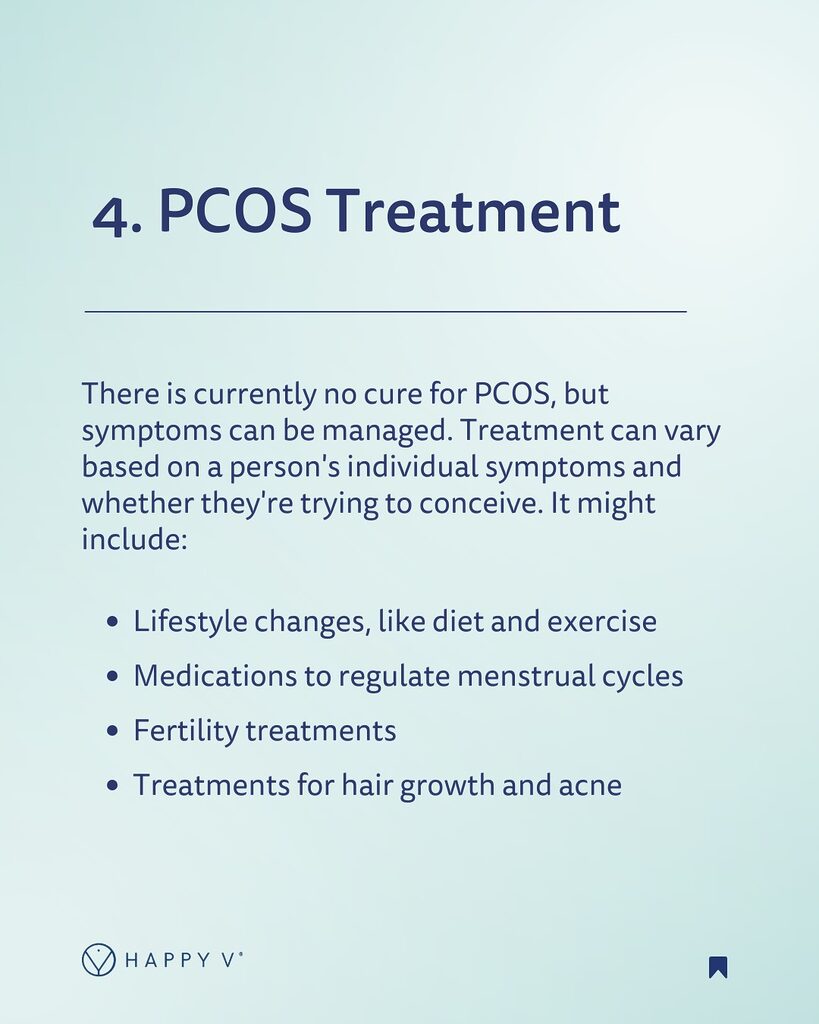
Consistent monitoring and regular checkups are essential to assess treatment effectiveness and identify potential health risks or complications. With proper treatment, individuals with PCOS can manage symptoms and improve their overall quality of life. It’s vital to note that while PCOS is manageable, it can still increase the risk of health conditions such as high blood pressure, high cholesterol, and cardiovascular disease. The following sections will delve into the various treatment options in more detail.
Lifestyle Changes
Living a healthy lifestyle is an important aspect of managing PCOS. Simple lifestyle changes such as losing weight, exercising regularly, and following a balanced diet can have a positive impact on reducing the severity of PCOS symptoms and improving overall health.
Studies have shown that lifestyle changes can help reduce insulin resistance, improve menstrual regularity, and improve body weight and waist circumference. For instance, a study involving 28 women with PCOS found that after 12 weeks of lifestyle modifications, 60.7% of the participants experienced menstrual cycle regulation.
In addition, a lifestyle intervention program that included dietary changes and exercise improved ovulation and pregnancy rates. After six months of the program, 47.6% of the participants had regular ovulation, and 28.6% became pregnant.
However, lifestyle changes are not a cure for PCOS, but they can effectively manage symptoms and promote overall health. Working closely with a healthcare provider to create a personalized plan that includes lifestyle changes can lead to better outcomes and quality of life.
Additionally, lifestyle factors such as a high-sugar or high-fat diet may interact with genetic factors to increase the risk of developing PCOS.
Watch out for THESE foods if you have PCOS!?
PCOS, short for Polycystic Ovarian Syndrome, is a hormonal imbalance that can lead to ovarian cysts, unusual hair growth, inflammation, and more.
Studies suggest that consuming certain inflammation-triggering foods can worsen PCOS symptoms and increase the risk of other health issues, so it’s important to limit or avoid these foods to better manage your PCOS symptoms.
This list includes:
? Saturated fats such as butter or margarine
✅ Instead: Opt for extra virgin olive oil or coconut oil
? Refined flour such as white bread, rolls, pizza crust, and pasta
✅ Instead: Opt for whole grains
? Fried foods such as potato chips, corn chips, and anything fried
✅ Instead: Opt for non-starchy or baked options
? Processed meats such as deli luncheon meat or hot dogs
✅ Instead: Opt for omega-3-rich foods like fish or protein-rich legumes
Medications
Medications can help manage specific symptoms of PCOS. For example, birth control pills are often used to regulate menstrual cycles and reduce excessive hair growth. These medications prevent the ovaries from releasing eggs and lower androgen levels.
In addition to birth control pills, other medications can be prescribed to help with ovulation. A randomized controlled trial found that letrozole was more effective than clomiphene citrate for inducing ovulation in people with PCOS. The study involved 750 participants with PCOS, and letrozole resulted in ovulation in 27.5% of the cycles, compared to 19.1% with clomiphene citrate.
It’s essential to work closely with a healthcare provider when taking medications for PCOS, as they can have potential side effects and may interact with other medicines or supplements. Your healthcare provider can help determine the best drug and dosage for your needs. Regular checkups are also important to monitor the medication’s effectiveness and identify potential complications.
Fertility Treatments
For those with PCOS who are trying to conceive, fertility treatments may be necessary to increase the chances of pregnancy. Ovulation induction medications, such as letrozole and clomiphene citrate, can help stimulate ovulation and increase the likelihood of conception. Intrauterine insemination (IUI) is another option, which involves placing sperm directly into the uterus to increase the chances of fertilization.
In vitro fertilization (IVF) has also been shown to be an effective treatment for women with PCOS who have difficulty conceiving. IVF involves fertilizing eggs with sperm outside the body and transferring the resulting embryos into the uterus. One study compared pregnancy and live birth rates for women with and without PCOS who underwent IVF. The study found that women with PCOS had similar pregnancy and live birth rates as women without PCOS, at 43.6% and 33.8%, respectively, compared to 47.6% and 36.9% for women without PCOS.
It’s important to note that fertility treatments can be expensive and may not always be covered by insurance. It’s also essential to discuss the risks and benefits of each treatment option with a healthcare provider, as well as any potential side effects and success rates based on individual factors.
Surgery
In rare cases, surgery may be recommended to manage PCOS symptoms. For example, if someone has large ovarian cysts that are causing pain or infertility, surgery may be necessary to remove them. Surgery can also be used to reduce excessive hair growth in some cases.
However, surgery is not typically the first line of treatment for PCOS and is usually only considered in specific situations. Other treatments, such as ovulation induction medications, IUI, or IVF, may be more appropriate for managing infertility in individuals with PCOS.
Additionally, non-surgical options like contraception, including birth control pills, can help regulate menstrual cycles and reduce symptoms like excessive hair growth. Electrolysis can also be used to remove unwanted hair permanently. Managing PCOS is an integral part of health, and various treatments are available to help those struggling with this condition.
Final Thoughts
PCOS is a common hormonal disorder that affects many individuals with female reproductive organs. It can lead to various symptoms, including irregular periods, excessive hair growth, and infertility. However, many treatment options are available to manage PCOS symptoms and improve overall health and well-being.
For those who want to manage their symptoms without medication, lifestyle changes such as regular exercise and a healthy diet can make a significant difference. However, medication options such as birth control pills and letrozole can also effectively manage specific symptoms of PCOS, such as regulating menstrual cycles and inducing ovulation.Living with PCOS can be challenging, but it’s important to remember that you’re not alone. By working closely with a healthcare provider and surrounding yourself with a supportive team, you can find the right treatment plan for your unique needs. Remember to prioritize self-care, such as healthy eating and regular exercise, to improve your overall well-being. With determination and the right resources, you can manage your symptoms and live a fulfilling life with PCOS.
- Teede HJ, Misso ML, Costello MF, et al. Recommendations from the international evidence-based guideline for assessing and managing polycystic ovary syndrome. Hum Reprod. 2018;33(9):1602-1618. doi:10.1093/humrep/dey256
- Diamanti-Kandarakis, E., & Dunaif, A. (2012). Insulin resistance and the polycystic ovary syndrome revisited: an update on mechanisms and implications. Endocrine Reviews, 33(6), 981-1030.
- Rotterdam ESHRE/ASRM-Sponsored PCOS Consensus Workshop Group. (2004). Revised 2003 consensus on diagnostic criteria and long-term health risks related to polycystic ovary syndrome (PCOS). Human Reproduction, 19(1), 41-47.
- Ehrmann, D. A. (2005). Polycystic ovary syndrome. New England Journal of Medicine, 352(12), 1223-1236.
- Escobar-Morreale HF, Luque-Ramírez M, González F. Circulating inflammatory markers in polycystic ovary syndrome: a systematic review and meta-analysis. Fertil Steril. 2011 Mar 1;95(3):1048-58.e1-2. doi: 10.1016/j.fertnstert.2010.11.036
- Palomba S, Santagni S, Falbo A, La Sala GB. Complications and challenges associated with polycystic ovary syndrome: current perspectives. Int J Womens Health. 2015 Jul 31;7:745-63. doi: 10.2147/IJWH.S70314
- Hu et al., 2017
- Sun et al., 2020
- Teede, H. J., Misso, M. L., Costello, M. F., Dokras, A., Laven, J., Moran, L., … & Yildiz, B. O. (2018). Recommendations from the international evidence-based guideline for assessing and managing polycystic ovary syndrome. Fertility and sterility, 110(3), 364-379.
- Teede, H. J., Misso, M. L., Costello, M. F., Dokras, A., Laven, J., Moran, L., … & Yildiz, B. O. (2018). Recommendations from the international evidence-based guideline for assessing and managing polycystic ovary syndrome. Fertility and sterility, 110(3), 364-379.
- Palomba, S., de Wilde, M. A., Falbo, A., Koster, M. P., La Sala, G. B., & Fauser, B. C. (2015). Pregnancy complications in women with polycystic ovary syndrome. Human reproduction update, 21(5), 575-592.
- Teede, H., et al. (2010). “Guidelines for the diagnosis and management of polycystic ovary syndrome.” Human Reproduction, 25(12), 1-19.
- Legro, R. S., et al. (2015). “Prevalence and predictors of risk for type 2 diabetes mellitus and impaired glucose tolerance in polycystic ovary syndrome: a prospective, controlled study in 254 affected women.” The Journal of Clinical Endocrinology and Metabolism, 84(1), 165-169.
- Glueck, C. J., et al. (2001). Incidence and treatment of metabolic syndrome in newly referred women with confirmed polycystic ovarian syndrome. Diabetes Care, 24(2), 203-208.
- Roos et al. (2011). Prevalence of cardiovascular disease and risk factors in PCOS: a long-term follow-up study. Fertility and Sterility, 97(1), 150-155.
- Sam, S., Dunaif, A., & Narasimhan, R. (2019). An update on cardiovascular outcomes in women with polycystic ovary syndrome. Women’s Health, 15, 1745506519872987. https://doi.org/10.1177/1745506519872987
- Zhao, A.-Y., Dai, Y.-J., Lian, J.-F., Huang, Y., Lin, J.-G., Dai, Y.-B., & Xu, T.-W. (2018). YAP regulates ALDH1A1 expression and stem cell properties of bladder cancer cells. OncoTargets and Therapy, 11, 6313–6322. doi: 10.2147/OTT.S170858
- Jia, F., & Lin, R. (2015). Cymbiodyta lishizheni sp. nov. is the second species of the genus from China. Zootaxa, 3985(3), 446–450. https://doi.org/10.11646/zootaxa.3985.3.9
- Legro, R. S., Brzyski, R. G., Diamond, M. P., Coutifaris, C., et al., for the NICHD Reproductive Medicine Network*. (2014). Letrozole versus Clomiphene for Infertility in the Polycystic Ovary Syndrome. New England Journal of Medicine, 371, 119-129. DOI: 10.1056/NEJMoa1313517
- Shah, E., Reuber, M., Goulding, P., Flynn, C., Delanty, N., & Kemp, S. (2016). Clinical experience with adjunctive perampanel in adult patients with uncontrolled epilepsy: A UK and Ireland multicentre study. Seizure, 34, 1–5. https://doi.org/10.1016/j.seizure.2015.10.017
- A-
- A+

